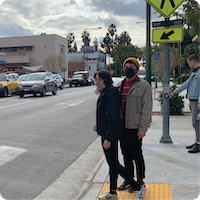 The Qualitative Pedestrian Environments Data (QPED) Toolkit is helping communities and decision-makers better understand neighborhood walkability from the perspective of a different kind of expert: the people out walking in their communities. QPED is a simple, modifiable, and powerful toolkit of community engagement and data collection tools, protocols, and trainings for use by researchers, agencies, and community organizations. The tools are designed to help users identify holistic strategies for improving neighborhood walkability in different community contexts, through brief structured on-street interviews. The QPED Toolkit includes:
The Qualitative Pedestrian Environments Data (QPED) Toolkit is helping communities and decision-makers better understand neighborhood walkability from the perspective of a different kind of expert: the people out walking in their communities. QPED is a simple, modifiable, and powerful toolkit of community engagement and data collection tools, protocols, and trainings for use by researchers, agencies, and community organizations. The tools are designed to help users identify holistic strategies for improving neighborhood walkability in different community contexts, through brief structured on-street interviews. The QPED Toolkit includes:
- On-Street Interview Guide (English and Spanish),
- Data Collection Manual,
- Training Materials, and
- Data Entry Template
QPED was developed at The University of Arizona in collaboration with Living Streets Alliance and with support from the CDC's Physical Activity Policy Research Network (PAPRN+) and NITC. The tool stemmed from research showing differences in experiences of Hispanic vs. white neighborhoods, which points to a need to better understand what makes a neighborhood walkable for different communities. The tool is in use in Tucson, AZ and has been downloaded by a couple dozen public agencies.
Learn more about the project Access to Opportunities: Redefining Planning Methods and Measures for Disadvantaged Populations, led by Arlie Adkins of University of Arizona.



